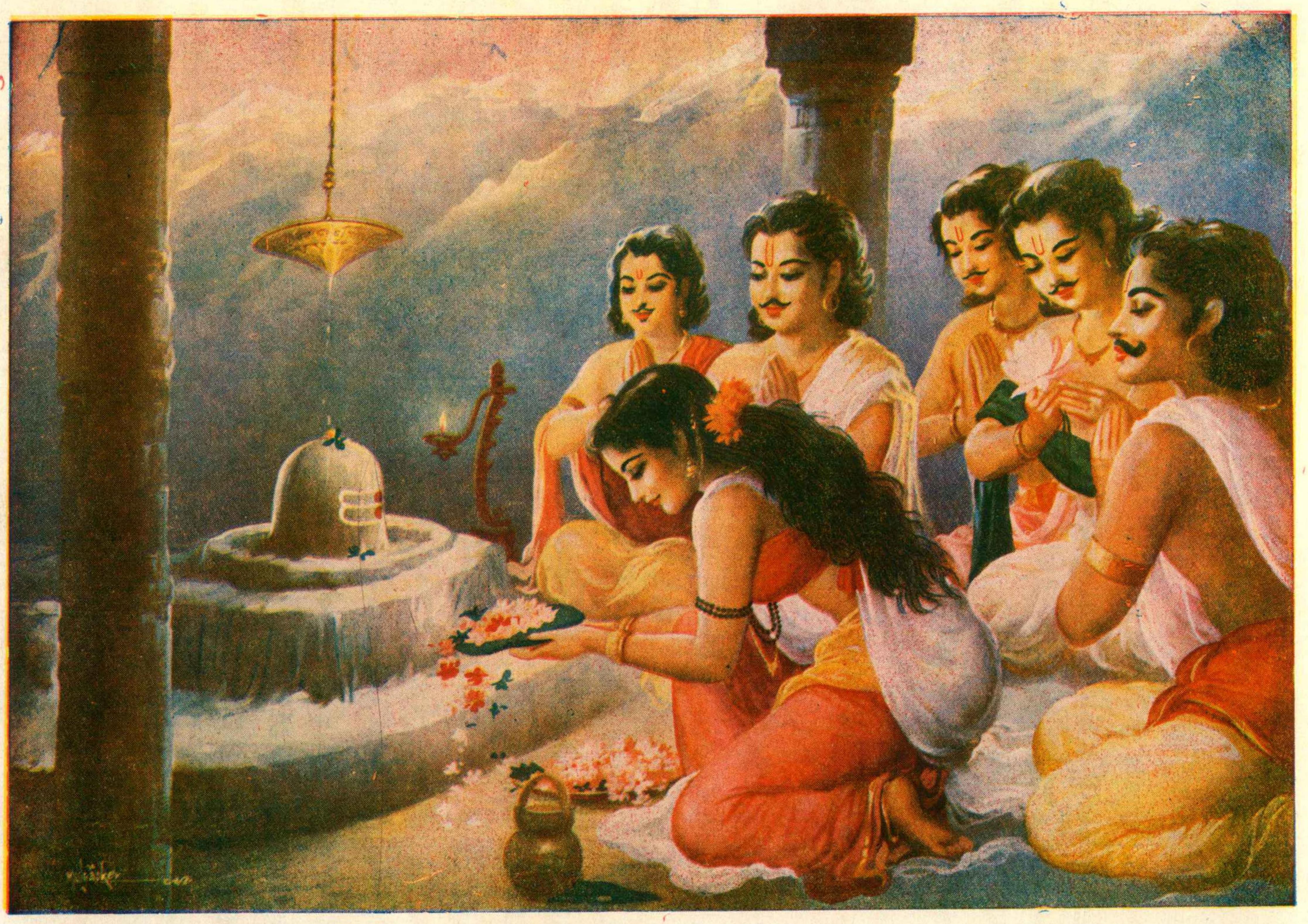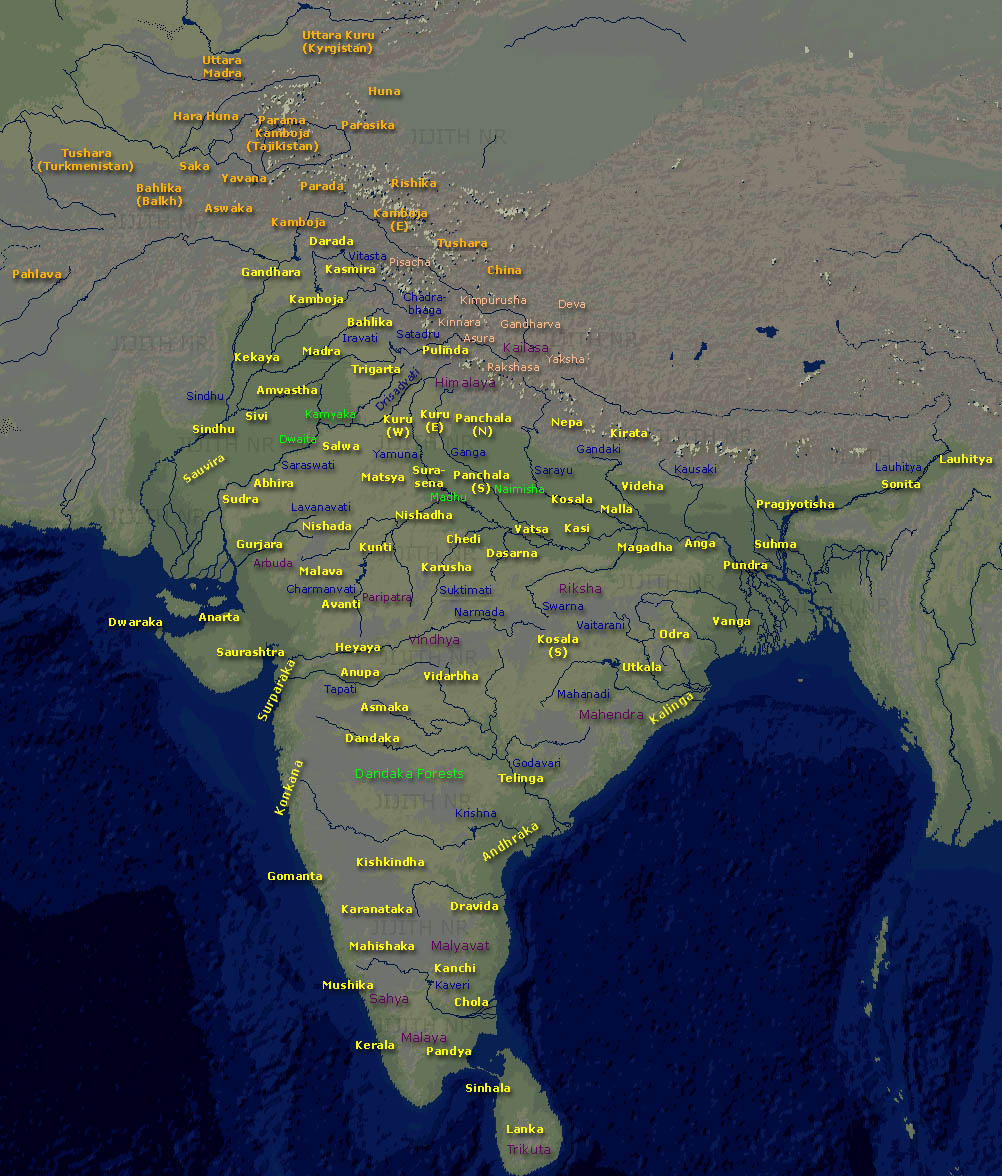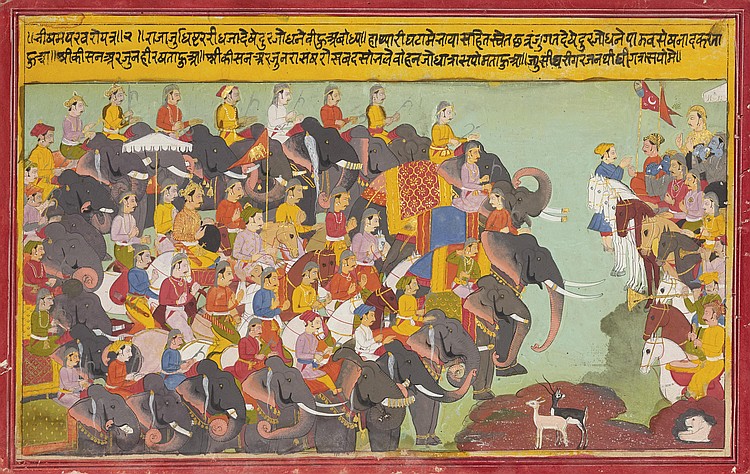|
Kirātārjunīya
''Kirātārjunīya'' (, ''Of Kirata and Arjuna'') is an epic poem by Bhāravi, written in Sanskrit. Believed to have been composed in the 6th century or earlier, it consists of eighteen cantos describing the combat between Shiva (in the guise of a '' kirata'', or "mountain-dwelling hunter"), and Arjuna. Along with the ''Naiṣadhacarita'' and the ''Shishupala Vadha'', it is one of the larger three of the six Sanskrit mahakavyas, or great epics. It is noted among Sanskrit critics both for its gravity or depth of meaning, and for its forceful and sometimes playful expression. This includes a canto set aside for demonstrating linguistic feats, similar to constrained writing. Later works of epic poetry followed the model of the ''Kirātārjunīya''. Synopsis Overview The ''Kirātārjunīya'' predominantly features the ''Vīra rasa'', or the mood of valour. It expands upon a minor episode in the ''Vana Parva'' ("Book of the Forest") of the ''Mahabharata'': While the Pandavas a ... [...More Info...] [...Related Items...] OR: [Wikipedia] [Google] [Baidu] |
Bhāravi
Bharavi () was a 6th century Indian poet known for his epic poem ''Kirātārjunīya'', one of the six ''mahakavyas'' in classical Sanskrit. Date According to multiple grant inscriptions of the Ganga dynasty, such as the Gummareddipura inscription, the Ganga king Durvinita wrote a Kannada-language commentary on the Canto 15 of Bharavi's ''Kirātārjunīya''. The date of the Gummareddipura inscription is debated among scholars, but the end of Durvinita's reign is dated to c. 580 CE, which means that Bharavi lived around or before this time. ''Avanti-sundara-katha'' of Dandin (7th-8th century) suggests that Bharavi was a contemporary of the kings Simha-vishnu, Vishnu-vardhana, and Durvinita; he was also a contemporary of Dandin's fourth-generation ancestor Damodara (see Biography below). Based on this account, Sanskrit scholar G. Harihara Sastri theorizes prince Kubja Vishnuvardhana of Chalukya family was a patron of Bharavi, before he became the Eastern Chalukya king around ... [...More Info...] [...Related Items...] OR: [Wikipedia] [Google] [Baidu] |
Bharavi
Bharavi () was a 6th century Indian poet known for his epic poem '' Kirātārjunīya'', one of the six '' mahakavyas'' in classical Sanskrit. Date According to multiple grant inscriptions of the Ganga dynasty, such as the Gummareddipura inscription, the Ganga king Durvinita wrote a Kannada-language commentary on the Canto 15 of Bharavi's '' Kirātārjunīya''. The date of the Gummareddipura inscription is debated among scholars, but the end of Durvinita's reign is dated to c. 580 CE, which means that Bharavi lived around or before this time. ''Avanti-sundara-katha'' of Dandin (7th-8th century) suggests that Bharavi was a contemporary of the kings Simha-vishnu, Vishnu-vardhana, and Durvinita; he was also a contemporary of Dandin's fourth-generation ancestor Damodara (see Biography below). Based on this account, Sanskrit scholar G. Harihara Sastri theorizes prince Kubja Vishnuvardhana of Chalukya family was a patron of Bharavi, before he became the Eastern Chalukya king ar ... [...More Info...] [...Related Items...] OR: [Wikipedia] [Google] [Baidu] |
Vana Parva
The Vana Parva ("Book of the Forest") is the third of the eighteen ''parvas'' (books) of the Indian epic ''Mahabharata''.van Buitenen, J.A.B. (1975) ''The Mahabharata: Book 2: The Book of the Assembly Hall; Book 3: The Book of the Forest''. Chicago, IL: University of Chicago Press Vana Parva traditionally has 21 parts and 324 chapters.Dutt, M.N. (1896) ''The Mahabharata (Volume 3): Vana Parva''. Calcutta: Elysium Press The Textual criticism, critical edition of Vana Parva contains 16 parts and 299 chapters. The parva is a chronicle of the twelve-year journey of the Pandavas in a forest, where they learn life lessons and build character.Bibek Debroy (2011), The Mahābhārata, Volume 3, , Penguin Books Vana Parva contains discourses on virtues and ethics; myths of Arjuna, Yudhishthara, and Bhima; and the tales of "Nahusha the Snake and Yudhishthira" and "Ushinara and the Hawk". It also includes the love stories of "Nala and Damayanti" and "Savitri and Satyavan". Structure and chapt ... [...More Info...] [...Related Items...] OR: [Wikipedia] [Google] [Baidu] |
Shishupala Vadha
The Shishupala Vadha (, IAST: ''Śiśupāla-vadha'', ''lit.'' "the slaying of Shishupala") is a work of classical Sanskrit poetry (''kāvya'') composed by Māgha in the 7th or 8th century. It is an epic poem in 20 ''sarga''s (cantos) of about 1800 highly ornate stanzas, and is considered one of the five Sanskrit ''mahakavya''s, or "great epics". It is also known as the ''Māgha-kāvya'' after its author. Like other ''kavya''s, it is admired more for its exquisite descriptions and lyrical quality than for any dramatic development of plot. Its 19th canto is noted for verbal gymnastics and wordplay; see the section on #Linguistic_ingenuity, linguistic ingenuity below. Contents As with most Sanskrit ''kāvya'', the plot is drawn from one of the epics, in this case the Mahabharata. In the original story, Shishupala, king of the Chedi Kingdom, Chedis in central India, after insulting Krishna several times in an assembly, finally enrages him and has his head struck off. The 10th-century ... [...More Info...] [...Related Items...] OR: [Wikipedia] [Google] [Baidu] |
Pashupatastra
The ''Pashupatastra'' (IAST: Pāśupatāstra, Sanskrit: पाशुपतास्त्र; the Pashupati, an epithet of Lord Shiva, Shiva) an Astra (weapon), astra, a celestial missile, affiliated to the Hinduism, Hindu deity Shiva, as well as Kali and Mahadevi, Adi Parashakti, which can be discharged by the mind, the eyes, words, or a bow. Description Never to be used against lesser enemies or by lesser warriors, the Pashupatastra is capable of destroying creation and vanquishing all beings. In the Mahabharata, only Arjuna and in the Ramayana, only the sage Vishvamitra, sage Parashurama, Indrajit and Rama possessed the Pashupatastra. It is one of the six ''Mantramukta'' weapons that cannot be resisted. Literature Mahabharata After the battle at the Khandava Forest, Khandava forest, Indra had promised Arjuna to give him all his weapons, as a boon for matching him in battle, with the requirement that Shiva should be appeased by him. Following the advice of Krishna to un ... [...More Info...] [...Related Items...] OR: [Wikipedia] [Google] [Baidu] |
Kirata
The Kirāta () is a generic term in Sanskrit literature for people who had territory in the mountains, particularly in the Himalayas and Northeast India and who are believed to have been Sino-Tibetan in origin. Historical mention and mythology The ''Kirata''s often mentioned along with Cinas (Chinese), and slightly different from the Nishadas, are first mentioned in the Yajurveda (''Shukla'' XXX.16; ''Krisha'' III.4,12,1), and in the Atharvaveda (X.4,14). According to Suniti Kumar Chatterji, the name ''Kirata'' seems to be used for any non-Aryan hill-folk, however Manu's Dharmashastra (X.44) calls them "degraded Kshatriyas", which Chatterji infers to be a term for people who were advanced in military or civilization to some degree and not complete barbarians. It is speculated that the term is a Sanskritization of a Tibeto-Burman tribal name, like that of Kirant or Kiranti of eastern Nepal. In the ''Periplus'', the Kirata are called Kirrad ... [...More Info...] [...Related Items...] OR: [Wikipedia] [Google] [Baidu] |
Draupadi
Draupadi (), also referred to as Krishnā, Panchali and Yajnaseni, is the central heroine of the Indian epic poetry, ancient Indian epic ''Mahabharata''. In the epic, she is the princess of Panchala Kingdom, who later becomes the empress of Kuru kingdom, Kuru Kingdom. She is the Polyandry, common wife of the five Pandava brothers—Yudhishthira, Bhima, Arjuna, Nakula, and Sahadeva—and is renowned for her beauty, courage, devotion, intelligence and rhetorical skills. She is also described as ''sakhi''—a close friend—of the god Krishna. Draupadi, along with her twin brother Dhrishtadyumna, emerges fully grown from a ''yajna'' (fire sacrifice) organized by King Drupada of Panchala. Draupadi’s marriage is determined through a ''svayamvara'' (self-choice ceremony), structured as an archery contest of great difficulty. Arjuna succeeds in the challenge and wins her hand. However, their mother, Kunti, unknowingly instructs her sons to share whatever they had brought home, resu ... [...More Info...] [...Related Items...] OR: [Wikipedia] [Google] [Baidu] |
Bhima
Bhima (, ), also known as Bhimasena (, ), is a hero and one of the most prominent characters in the Hindu epic ''Mahabharata''. As the second of the five Pandava brothers, Bhima was born to Kunti—the wife of King Pandu—fathered by Vayu, the wind god, which bestowed upon him superhuman strength from birth. His rivalry with the Kauravas, especially Duryodhana, defined much of his life, with this tension ultimately erupting in the Kurukshetra War, where Bhima killed all hundred Kaurava brothers. Bhima's life was filled with extraordinary episodes that showcased his strength and bravery. From childhood, where he was poisoned, to his victories over formidable foes like Bakasura, Hidimba, and Jarasandha, Bhima's adventures are integral to the ''Mahabharata''’s storyline. His raw, earthy nature is reflected in the brutal slaying of his enemies, his immense appetite and his marriage with Hidimbi, a rakshasi (a demoness), who bore him a son, Ghatotkacha, a powerful warrior who woul ... [...More Info...] [...Related Items...] OR: [Wikipedia] [Google] [Baidu] |
Yudhishthira
Yudhishthira (Sanskrit: युधिष्ठिर, ud̪ʱiʂʈʰiɾᵊ IAST: ''Yudhiṣṭhira''), also known as Dharmaputra, is the eldest among the five Pandavas, and is also one of the central characters of the ancient Indian epic ''Mahabharata''. He was the king of Indraprastha and later the King of Kuru Kingdom in the epic. Yudhishthira was the son of Kunti, the first wife of King Pandu, fathered by the god Yama due to Pandu's inability to have children. Yudhishthira held a strong belief in ''dharma'' (morals and virtues) and was chosen as the crown prince of Kuru. But after the Lakshagriha incident, he was presumed dead and his cousin Duryodhana was appointed as the new heir. The kingdom was split in half due to a succession dispute between Yudhishthira and Duryodhana. Yudhishthira received the barren half, which he later transformed into the magnificent city of Indraprastha. Yudhishthira and his brothers had a polyandrous marriage with Draupadi, the princess ... [...More Info...] [...Related Items...] OR: [Wikipedia] [Google] [Baidu] |
Arjuna
Arjuna (, , Help:IPA/Sanskrit, [ɐɾd͡ʒun̪ə]) is one of the central characters of the ancient Hindu epic ''Mahabharata''. He is the third of the five Pandava brothers, and is widely regarded as the most important and renowned among them. He is the son of Indra, the king of the Deva (Hinduism), gods, and Kunti, wife of King Pandu of Kuru kingdom, Kuru dynasty—making him a Demigod, divine-born hero. Arjuna is famed for his extraordinary prowess in archery and mastery over Astra (weapon), celestial weapons. Throughout the epic, Arjuna sustains a close friendship with his maternal cousin, Krishna, who serves as his spiritual guide. Arjuna is celebrated for numerous heroic exploits throughout the epic. From childhood, he emerges as an excellent pupil, studying under the warrior-sage Drona. In his youth, Arjuna wins the hand of Draupadi, the princess of the Pañcāla, Panchalas, by excelling in a formidable archery competition. Soon after, he goes on a journey during a period ... [...More Info...] [...Related Items...] OR: [Wikipedia] [Google] [Baidu] |
Kauravas
''Kaurava'' is a Sanskrit term which refers to descendants of Kuru, a legendary king of India who is the ancestor of many of the characters of the epic ''Mahabharata''. Usually, the term is used for the 100 sons of King Dhritarashtra and his wife Gandhari. Duryodhana, Dushasana, Vikarna and Chitrasena are the most popular among the brothers. They also had a sister named Dussala and a half-brother named Yuyutsu. Etymology The term ''Kauravas'' is used in the ''Mahabharata'' with two meanings , *The wider meaning is used to represent all the descendants of Kuru. This meaning, which includes the Pandava brothers, is often used in the earlier parts of popular renditions of the ''Mahabharata''. *The narrower but more common meaning is used to represent the elder line of the descendants of Kuru. This restricts it to the children of King Dhritarashtra, excluding the children of his younger brother, Pandu, whose children form the Pandava line. The rest of this article deals ... [...More Info...] [...Related Items...] OR: [Wikipedia] [Google] [Baidu] |
Indra
Indra (; ) is the Hindu god of weather, considered the king of the Deva (Hinduism), Devas and Svarga in Hinduism. He is associated with the sky, lightning, weather, thunder, storms, rains, river flows, and war. [3 volumes] Indra is the most frequently mentioned deity in the ''Rigveda''. He is celebrated for his powers based on his status as a god of order, and as the one who killed the great evil, an Asura (Hinduism), asura named Vritra, who obstructed human prosperity and happiness. Indra destroys Vritra and his "deceiving forces", and thereby brings rain and sunshine as the saviour of mankind. Indra's significance diminishes in the post-Vedic Indian literature, but he still plays an important role in various mythological events. He is depicted as a powerful hero. According to the ''Vishnu Purana'', Indra is the title borne by the king of the gods, which changes every Manvantara – a cyclic period of time in Hindu cosmology. Each Manvantara has its own Indra and the In ... [...More Info...] [...Related Items...] OR: [Wikipedia] [Google] [Baidu] |







